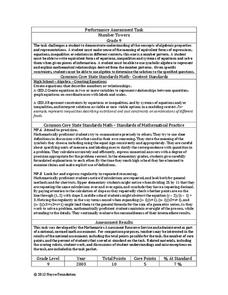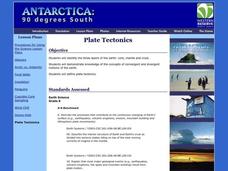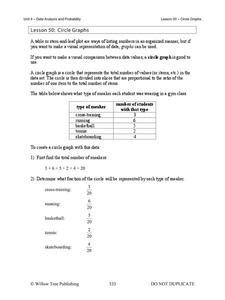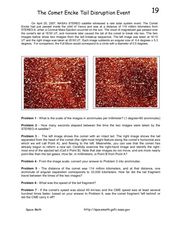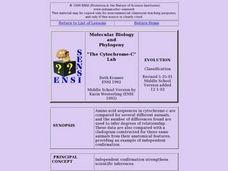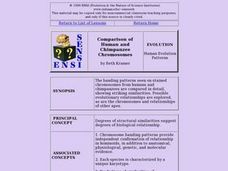Inside Mathematics
Two Solutions
Many problems in life have more than one possible solution, and the same is true for advanced mathematics. Scholars solve seven problems that all have at least two solutions. Then three higher-level thinking questions challenge them to...
Inside Mathematics
Number Towers
Number towers use addition or multiplication to ensure each level is equal. While this is common in factoring, it is often not used with algebraic equations. Solving these six questions relies on problem solving skills and being able to...
EngageNY
Solving Equations Involving Linear Transformations of the Coordinate Space
Explore methods for solving linear systems with your classes and introduce learners to using matrices as a viable method. Scholars are able to recognize situations where matrices are the efficient method of solving. Application questions...
Curated OER
Snow Day
It's a snow day, and two brothers attending schools with different schedules each got a late start to the day. But who had the shorter school day? That's what your class will find out as they apply their knowledge of fractions to this...
Inside Mathematics
Winning Spinners
Winning a spin game is random chance, right? Pupils create a table to determine the sample space of spinning two spinners. Individuals determine the probability of winning a game and then modify the spinners to increase the probability...
Willow Tree
Solving Quadratic Equations
Polynomials are full of solutions! Learners understand that the degree determines the number of solutions. Examples show quadratic equations solved by factoring and by using the quadratic formula. A cubic equation is even mixed in for...
EngageNY
Conversion Between Celsius and Fahrenheit
Develop a formula based upon numerical computations. The 31st part of a 33-part unit has the class determine the formula to convert a temperature in Celsius to a temperature in Fahrenheit. They do this by making comparisons between the...
Curated OER
One Size Fits All?
Students describe the differences between an estimate and a guess. They create reasonable estimates based on comparison and activities. Students explain how estimation is helpful in showing the relative size on a scale. They also...
Messenger Education
Cooling with Sunshades
Messenger's sun shade measures 8 ft x 6 ft and will have temperatures reaching 700 degree Fahrenheit on the outside while maintaining a cool 70 degrees underneath. In the third activity of four, groups discuss the basic properties of...
Inside Mathematics
Expressions
Strive to think outside of the quadrilateral parallelogram. Worksheet includes two problems applying prior knowledge of area and perimeter to parallelograms and trapezoids. The focus is on finding and utilizing the proper formula and...
Curated OER
Investigating Evolutionary Questions: Bats, Whales, Reptiles, Birds, Animal Classification
Students are guided through a process in which three questions are addressed by retrieving beta hemoglobin sequences from online databases, and using online tools to compare those sequences in student-selected animals.
Curated OER
Discovering Pi/Welcome to Pi Day
Students explore pi. In this circle measurement lesson, students define and identify radius, diameter, circumference, and perimeter. Students work in groups to measure several plastic lids and record their findings. Students compare the...
Curated OER
Exploring Geometry on the Sphere
In this geometry worksheet, students define important vocabulary dealing with circles. They measure cricles to the nearest degree. There are 11 word problems to be solved.
Noyce Foundation
Truffles
Knowing how to scale a recipe is an important skill. Young mathematicians determine the amount of ingredients they need to make a certain number of truffles when given a recipe. They determine a relationship between ingredients given a...
Curated OER
Plate Tectonics
Students identify the three layers of the earth: core, mantle and crust. They demonstrate knowledge of the concepts of convergent and divergent motions of the earth and an understanding of plate tectonics.
EngageNY
Definition of Congruence and Some Basic Properties
Build a definition of congruence from an understanding of rigid transformations. The lesson plan asks pupils to explain congruence through a series of transformations. Properties of congruence emerge as they make comparisons to these...
Willow Tree
Circle Graphs
Pie isn't just for eating! Scholars learn to create pie charts and circle graphs to represent data. Given raw data, learners determine the percent of the whole for each category and then figure out the degree of the circle that percent...
Curated OER
Case Studies: Cross-Cultural Comparison
Students examine maps of Lebanon, Vietnam and Nigeria, discuss relationship between ethnicity, land and conflict, review material from case studies, complete comparison chart, and write essays comparing two of the case studies.
Curated OER
The Comet Encke Tail Disruption Event
In this comet tail disruption worksheet, students solve 7 problems using two images from NASA's STEREO satellite showing the breakup of the comet's tail. Students analyze the diagram and use the scale to solve the problems about time,...
Curated OER
Teddy Bears and Friends
Children begin by making direct comparisons between objects and putting a number of objects into order according to length. They are also introduced to measuring with multi-link cubes which allows them to compare objects which cannot be...
Curated OER
Molecular Biology and Primate Phylogenetics
Pairs of high school biologists compare amino acid differences in the beta hemoglobin of different primates. They use the information collected to construct a phylogenic tree. Follow-up discussion questions are provided. This is a...
Curated OER
The Cytochrome-C Lab
Learners examine a method biologists use to try to determine relationships. They examine how amino acid sequences have been determined for a number of proteins, and how scientists can make inferences about DNA based on the amino acid...
Curated OER
Superlative Adjectives
In this superlative adjectives instructional activity, students read a review of adjectives with -est suffixes, and adjectives followed by of, in, on, etc.. Students apply the information to fill in blanks and create sentences to write...
Curated OER
Comparison of Human and Chimpanzee Chromosomes
Pupils actively engage in the careful analysis of chromosome banding patterns and identify examples of inversion in homologous chromosomes.



